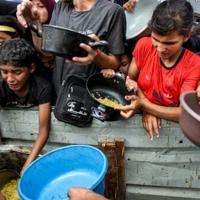Israel’s military announced on Sunday a “pause” in fighting around a south Gaza route during daylight hours to facilitate aid deliveries. This decision comes after months of warnings of famine in the besieged Palestinian territory.
The announcement of a “local, tactical pause of military activity” in an area of Rafah followed a day in which eight Israeli soldiers were killed in a blast near the far-southern city and three more troops died in other locations, marking one of the heaviest losses for the army in its conflict against Hamas militants.
UN agencies and aid groups have repeatedly raised concerns about severe shortages of food and other essentials in the Gaza Strip. These shortages are worsened by restrictions on overland access and the closure of the key Rafah crossing with Egypt since Israeli forces took control of it in early May.
Israel has defended its efforts to deliver aid to Gaza through its Kerem Shalom border near Rafah, attributing looting of supplies by militants and failures to distribute aid to civilians to humanitarian workers.
The military’s statement said that a “local, tactical pause of military activity for humanitarian purposes” will occur from 8:00am until 7:00pm every day along a designated route from the Kerem Shalom crossing to the Salah al-Din road and northwards. The route extends to Rafah’s European Hospital, about 10 kilometers from Kerem Shalom.
There were no reports of strikes, shelling, or fighting in Gaza on Sunday morning, though the military emphasized that there was “no cessation of hostilities in the southern Gaza Strip.”
The decision to pause military activity is aimed at increasing the volume of humanitarian aid entering Gaza following discussions with the UN and other organizations. This announcement also precedes the Muslim holiday of Eid al-Adha.
The US, which has been pushing for a ceasefire plan between Israel and Hamas, recently imposed sanctions on an extremist Israeli group for obstructing and attacking Gaza-bound aid convoys.
In Gaza City, resident Umm Ahmed Abu Rass lamented the dire situation, stating that there is a lack of food, water, fuel, and access to medical treatment, leaving residents with little hope for survival.
Regarding the military casualties, a military spokesman confirmed the deaths of eight soldiers in a blast near Rafah and additional fatalities in other parts of Gaza. Israeli Prime Minister Benjamin Netanyahu expressed condolences and affirmed the country’s commitment to its war goals against Hamas.
As the conflict continues, concerns about wider conflict in the region have been raised as violence escalates between Israel and Hezbollah, a Hamas ally. Diplomatic efforts for a truce in Gaza have stalled, and fears of further escalation persist.
Despite ongoing efforts to negotiate a ceasefire, Hamas remains firm on its demands for a complete withdrawal of Israeli forces from Gaza and a permanent ceasefire, while Israel has rejected these demands. The situation remains volatile as the conflict shows no signs of immediate resolution.





